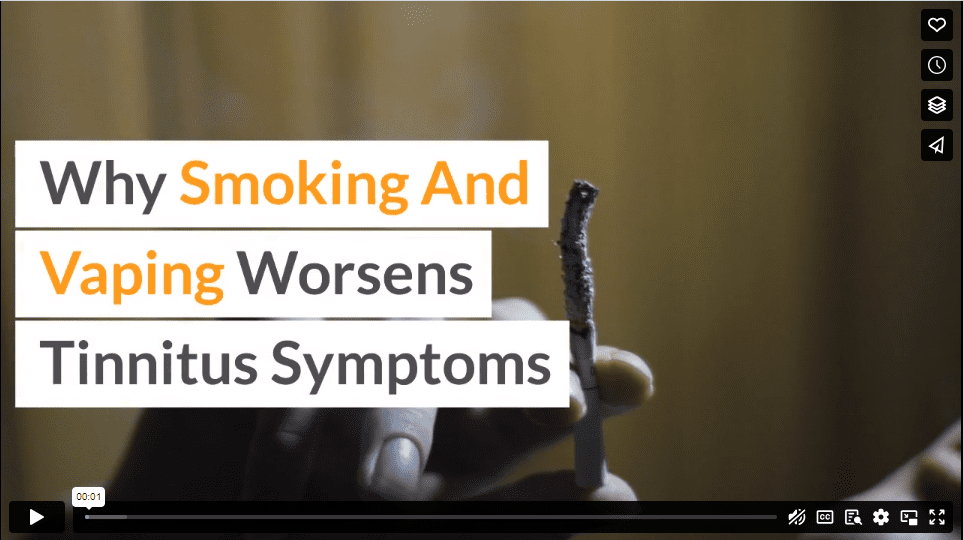By Barry Keate
Barry Keate, has lived with tinnitus over 40 years and has published 150+ research articles on numerous aspects of tinnitus. He is an expert on the condition and a well-known advocate for those with tinnitus.

(E-Liquids UK/unsplash)
Everyone has a guilty pleasure. For some, it is indulging in foods that taste good but won’t help their high blood pressure. For others, it may be spending more than they should on new clothes. For some, it’s smoking despite health warnings. While many people know smoking can damage your lungs, not everyone with tinnitus knows that smoking can worsen the ringing in their ears.
Why do cigarettes affect your ears? Will changing habits stop the damage, and how do you lessen symptoms?
How The Ear Works
To understand why breathing something through your mouth can cause damage to your ears, it helps to know how the ear works.
Sound waves strike the eardrum, which sends vibrations of different frequencies to a shell-shaped chamber called the cochlea. Inside the cochlea are tiny hair-like nerves, each resonating to a different frequency like piano strings. Each sends a signal to the brain through the auditory nerve, which we interpret as sound.
The tiny nerves get damaged through trauma, illness, infections, exposure to toxins, sustained loud sounds, or a sudden explosive sound. Once damaged, they send corrupted signals which your brain interprets as a ringing or rushing sound – your tinnitus. Or it quits sending signals, and you miss out on some of the sounds around you – hearing loss.
The eustachian tube connects the middle ear to the upper throat and will stabilize air pressure between your environment and inner ear. When you yawn, it allows a tiny exchange of air, so it equalizes. You might notice it as your ears pop on an airplane flight.
All of these delicate parts of your ears require adequate blood and oxygen to stay healthy and function properly.
How Smoking Affects The Ear
- Smoking raises blood pressure, decreasing blood flow and oxygen delivery to the cochlea, prolonging and worsening tinnitus symptoms.
- Nicotine irritates the eustachian tube, preventing proper pressure regulation and making your ears feel full.
- Nicotine is a stimulant that creates a heightened awareness of tinnitus symptoms, making them seem louder.
- Nicotine disrupts the auditory nerve signals to the brain.
- Nicotine causes inflammation which can cause or worsen tinnitus.
- Carbon monoxide from decreased functionality of the lungs crowds out oxygen in the blood needed for healthy cells.
- When burned, cigarettes produce approximately 7,000 different chemicals. Here are just a few that can negatively affect your tinnitus.
- Beryllium, formaldehyde, nickel, and polycyclic aromatic hydrocarbons cause shortness of breath.
- Benzene attacks the immune system.
- Cadmium and arsenic cause inflammation.
- Vinyl chloride, lead, ammonia, and hydrogen cyanide can damage the nervous system.
- Much of the vaping fluid is propylene glycol, which can cause hearing loss.
How to Reduce Tinnitus Symptoms
The longer you smoke or live in heavy concentrations of secondhand smoke, the more damage it may cause to your hearing. However, here are seven things you can do to feel better and manage your symptoms.
- Quit Smoking. It may be more easily said than done, but the fact remains that smoking will continue to affect your tinnitus. The sooner you quit and the longer you are smoke-free, the better your prognosis will be. While it may seem impossible, there are programs to help wean you off cigarettes and vaping. Without a constant borage of toxins, your body starts healing itself.
- Blood pressure starts to normalize after 24 hours.
- Biochemistry returns to normal after 21 days.
- Cardiovascular disease risks start to decline at 90 days, and breathing while exercising is easier.
- During the first nine months, your body regenerates lung tissues that help fight bronchial diseases and clear the lungs.
- Cardiovascular disease risks drop by 50% after one year, and by year 15, you are at the same level of risk as a nonsmoker.
- Avoid foods that worsen symptoms. Excess sodium or saturated fats in your diet can affect circulation to your ears, impacting the severity of your tinnitus symptoms.
- Use tinnitus natural supplements. Taking ginkgo biloba for ear ringing lowers inflammation, improves nerve conductivity, and increases cellular regeneration and healing.
- Actively manage your stress levels, as stress can increase symptoms. Additionally, high stress activates your fight or flight system, which makes you hyper-aware of your symptoms.
- Perform tinnitus reduction exercises that relax the tissues around the ear.
- Get adequate sleep. Insomnia can make everything worse. It also increases stress which will affect the severity of your symptoms.
- Live an active lifestyle that keeps your mind focused on pleasurable activities rather than your tinnitus.
Putting It All Together
It can be hard to let go of things we enjoy, especially when you don’t see an immediate payoff. Keeping track of your symptoms and any improvements will incentivize you to keep going.
As with most health-related problems, treating the whole person rather than focusing on only one complaint can be counterproductive. Adopting a healthier lifestyle centered around healthy living habits will ultimately give you the best possible outcome.
Infographic
Smoking elevates blood pressure, disrupts auditory signals, and produces harmful chemicals. Vaping fluid is linked to potential hearing loss. Discover eight strategies for symptom management in this infographic, including quitting smoking, dietary adjustments, natural supplements, stress management, tinnitus reduction exercises, adequate sleep, an active lifestyle, and holistic tracking of improvements. Transform your lifestyle for a better prognosis and overall well-being.

Video

